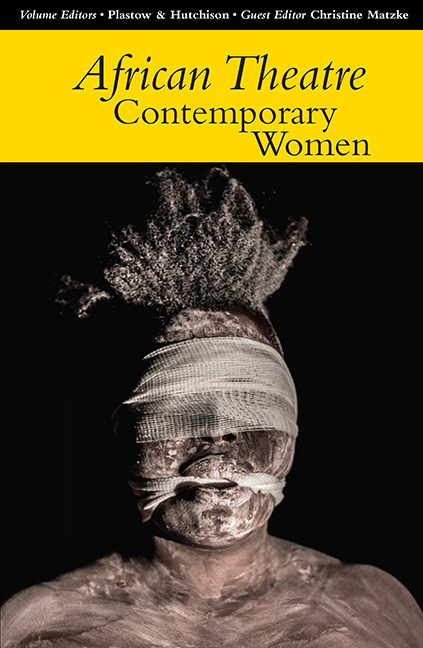Book contents
- Frontmatter
- Contents
- Notes on Contributors
- Editors’ Foreword: Women on the Front Line
- Introduction: Citizen & Artist: African women making theatre
- The Work of Dalia Basiouny: An artist's account
- Performativities as Activism: Addressing gender-based violence & rape culture in South Africa & beyond
- Exploring Poetic Voice in the Uganda Women's Intergenerational Theatre Project
- ‘After Images’: Impressions of the ‘after’ by South African performerchoreographer Mamela Nyamza
- Jalila Baccar of Tunisia: A portrait of an artist
- In Conversation: Interrogating & shifting societal perceptions of women in Botswana through theatre
- Binti Leo: Women in the arts in Tanzania
- Odile Gakire Katese: Making art & reinventing culture with women
- Contemporary Ethiopian Actresses
- Introducing The Sentence
- Playscript
- Book Reviews
Binti Leo: Women in the arts in Tanzania
Published online by Cambridge University Press: 05 July 2016
- Frontmatter
- Contents
- Notes on Contributors
- Editors’ Foreword: Women on the Front Line
- Introduction: Citizen & Artist: African women making theatre
- The Work of Dalia Basiouny: An artist's account
- Performativities as Activism: Addressing gender-based violence & rape culture in South Africa & beyond
- Exploring Poetic Voice in the Uganda Women's Intergenerational Theatre Project
- ‘After Images’: Impressions of the ‘after’ by South African performerchoreographer Mamela Nyamza
- Jalila Baccar of Tunisia: A portrait of an artist
- In Conversation: Interrogating & shifting societal perceptions of women in Botswana through theatre
- Binti Leo: Women in the arts in Tanzania
- Odile Gakire Katese: Making art & reinventing culture with women
- Contemporary Ethiopian Actresses
- Introducing The Sentence
- Playscript
- Book Reviews
Summary
Introduction
Looking at the story of independence of Tanzania, as elsewhere in Africa, performing arts, especially traditional dance groups led by women, were used extensively in the mid-twentieth century to deconstruct and openly challenge what Ruth Meena (2003: 148) describes as ‘the colonial and patriarchal systems, which were based on ideologies of exclusion’. These dance groups, such as lelemama, were significant during both the independence struggle and the post-independence deconstruction of stereotypes that perceive political power to be vested almost exclusively in men. Marjorie Mbilinyi (2010: 85) shows clearly that: ‘It was TANU women who forged alliances across ethnic and religious boundaries, who promoted Kiswahili as the medium of political discourse, who used local African cultural forms such as women's songs and dance groups to energise the nationalist struggle and make it their own’.
After independence, the ‘energising political struggle’ was transformed into women becoming the ‘implementation tools’ of the ruling party, TANU, later CCM. This meant that performing arts, especially ngoma(traditional dances), featured prominently on national platforms when political leaders wanted to communicate social policies and political propaganda to the people. At community level such performances continued to entertain, educate, conscientize and communicate. Mbilinyi (ibid.: 84) further argues that: ‘What is not understood is the degree to which this nationalist identity was constructed through the actions and thoughts of grassroot women politicians and activists, women who merged their struggles for individual dignity with that of a collective struggle for national autonomy and dignity as an African people’.
It is important to recognize these struggles by women on behalf of their sex, and for the nation, in order to situate and understand the role that Binti Leo (Today's Young Women) intends to play in contemporary Tanzania.
TANU women such as Bibi Titi Mohamed,4 who participated in the political independence struggles through lelemamagroups, had ‘political’ freedom and independence as their agenda (Geiger 2005: iv, 49). This was different from the women's movement in post-independence Tanzania prior to multi-party politics where most women had no space to advocate for their rights apart from supporting Ujamaa.
- Type
- Chapter
- Information
- African Theatre 14: Contemporary Women , pp. 73 - 84Publisher: Boydell & BrewerPrint publication year: 2015



